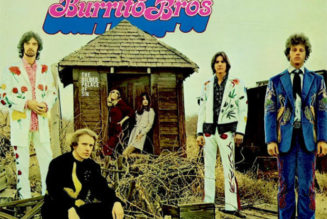
Every year, the Recording Academy continues to strive for fairness and transparency in the annual GRAMMY Awards voting process, and the 2024 GRAMMYs are no different.
The Recording Academy has updated the GRAMMY Awards Rules and Guidelines for the 2024 GRAMMYs, officially known as the 66th GRAMMY Awards, to implement a number of important amendments ahead of Music’s Biggest Night next year. These recent changes include the three newly announced GRAMMY categories; the migration of Producer Of The Year, Non-Classical and Songwriter Of The Year, Non-Classical, both existing categories, to the General Field; and much more.
For a deeper look at all the big changes occurring at the 2024 GRAMMYs, Recording Academy CEO Harvey Mason jr. chatted with GRAMMY.com to discuss the decision-making process behind the latest rule amendments and how the new rules and guidelines even the playing field for music people worldwide.
View the official GRAMMY Awards Rules and Guidelines Book for the 2024 GRAMMYs and visit the GRAMMY Award Update Center for a list of real-time changes to the GRAMMY Awards process.
Artificial intelligence (AI) is a massive topic of discussion and debate in every industry today. The new GRAMMY Awards rules state, “Only human creators are eligible to be submitted for consideration for, nominated for, or win a GRAMMY Award.” Why was it important that the GRAMMYs process account for this emerging technology and its impact on human artistic expression?
It’s important because AI is going to absolutely, unequivocally have a hand in shaping the future of our industry. The idea of being caught off guard by it and not addressing it is unacceptable.
Not knowing exactly what it’s going to mean or do in the next months and years gives me some pause and some concerns. But I absolutely acknowledge that it’s going to be a part of the music industry and the artistic community and society at large.
So, we have to start planning around that and thinking about what that means for us. How can we adapt to accommodate? How can we set guardrails and standards? There are a lot of things that need to be addressed around AI as it relates to our industry.
We actually held a summit recently with industry leaders, tech entrepreneurs, streaming platforms, and people from the artist community. We talked about the subject and discussed how the Recording Academy can be helpful: how we can play a role and the future of AI in music.
Can you speak to the AI-related protocols instituted for the 2024 GRAMMYs?
At this point, we are going to allow AI music and content to be submitted, but the GRAMMYs will only be allowed to go to human creators who have contributed creatively in the appropriate categories. If there’s an AI voice singing the song or AI instrumentation, we’ll consider it. But in a songwriting-based category, it has to have been written mostly by a human. Same goes for performance categories – only a human performer can be considered for a GRAMMY.
If AI did the songwriting or created the music, that’s a different consideration. But the GRAMMY will go to human creators at this point.
Recording Academy CEO Harvey Mason jr. | Michael Kovac
The number of GRAMMY Award fields has been consolidated from 26 to 11. How does this open up the process rather than close it off?
This gives so many voters the opportunity to actually use the full 10 votes that they have under the 10-3 voting system. The idea was to make sure voters were voting in categories and genres they had expertise or experience working in, as opposed to voters coming in, looking at the ballot, and just tracking names or voting for people that they thought were interesting or voting for music they had just heard, but did not fairly evaluate.
The 10-3 voting system restricts the number of Fields a voter can enter to three, and within those three Fields, a voter can cast 10 votes. What we were hearing from the community was that people were not able to use their full 10 votes because many of the Fields only had one, two or three categories in those Fields. So, depending on how you picked your three Fields, there was a potential that you would only be able to cast three votes total.
We’re leaning into the idea of utilizing our expertise and enabling our peers to really evaluate and vote in categories and genres that they are working in and are experts in.
The existing categories of Songwriter of the Year, Non-Classical and Producer of the Year, Non-Classical have been moved to the general field, what’s widely known as the Big Four categories. Why did the Recording Academy decide to make this change? What will be the impact of this change?
The Big Four is now the Big Six. Songwriting and producing are some of the fundamental building blocks of our industry — in addition to, of course, performing and recording.
We feel this change is an opportunity to allow our full voting membership to participate. We have done a lot of work around qualifying and requalifying our voters, and inviting a diverse group of voters to the table in our last three membership classes.
We are excited that our entire voting body will be able to contribute to such important categories like Songwriter Of The Year and Producer Of The Year. Again, these are such important parts of our Awards process. But bigger than that, they’re an important part of the music ecosystem.
Since these categories are not genre-specific, and they are across many different genres, we felt it was responsible to put them in the General Field so everyone could vote for these important awards.
At the 2022 GRAMMYs and 2023 GRAMMYs, the number of nominees in the General Field went from eight to 10. Now, at the upcoming 2024 GRAMMYs, that number is going back to eight. Can you explain this change and how it’s a positive for the overall GRAMMYs process?
We’re always going to try and listen to the music community. When they have suggestions or ideas, we’re going to react quicker than we ever have in the past. This change is a result of that.
Two years ago, we felt that expanding to 10 nominees would be more inclusive, allowing us to recognize a greater variety of genres and artists; that expansion was instituted.
Now, with the dynamic realignment between our diverse membership and our Awards process, we felt 10 was too many. We want to make sure the award is inclusive enough, while still being prestigious and exclusive.
These are all things that we take into consideration as an Academy — from our membership to our Trustees to our voters — when trying to find the sweet spot in terms of the number of nominees. We don’t know if it’s five or 10 or eight, but we’re going to go with eight next year.
If it feels wrong, or if there’s another way to improve the process in subsequent years, we’ll entertain that and move forward as best as we can to try and make sure we get this right and honor music.
In the Album Of The Year category, the baseline for earning a nomination has been raised to 20 percent of the album’s playing time for credited artists, featured artists, songwriters, producers, engineers, mixers, and mastering engineers. What necessitated this change, and how does this even the playing field?
Similarly, we’re trying to find the sweet spot of how to make sure we honor the key music creators who have dedicated so much time and effort to making the Album Of The Year.
Is 20 percent the right number? Is 33 percent the right number? Is zero the right number? I don’t have the definite answer other than our committees voted at 20 percent, the Trustees approved 20 percent, and we’re going to go with 20 percent and see how that feels to our members and community.
If it feels too exclusive, we can adjust and lower the percentage threshold. Or, if it feels like we have too many nominees and it’s not exclusive enough, then we can adjust again.
In the big picture, how will these amendments make the GRAMMYs process more open, transparent and fair?
Each and every amendment was created exactly with this in mind: openness, transparency, fairness. Every process that we undertake — every amendment or change to our Awards process that gets initiated — is done to make the process more fair, transparent and accurate. And when we find things that can be improved, we’re in the position now to be able to make those changes, thankfully.
Everything you’re seeing now is with the goal of being better and more accurate, honoring more music fairly and in relevant fashion, and making sure the process is transparent, fair and working.
2024 GRAMMYs: 4 Things To Know About The New Categories & Changes








![NBA 2K24 Takes Over NYC For Launch Party & More [Photos]](https://www.wazupnaija.com/wp-content/uploads/2023/09/nba-2k24-takes-over-nyc-for-launch-party-more-photos-327x219.jpg)
